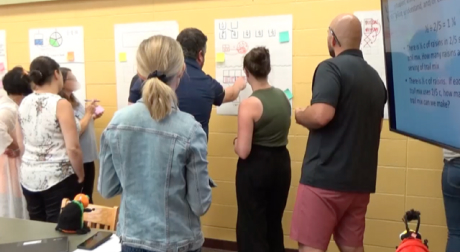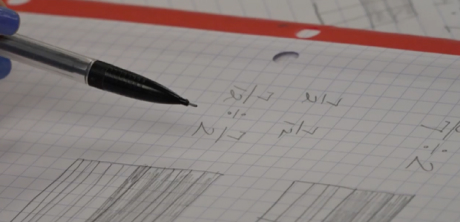
Rational Numbers Playground:
Applying and Refining a Model for Dynamic, Discussion-Based PD for Fractions, Ratios, and Proportions
Project Aim
We are developing professional development for teachers that engages them in thinking about the mathematics they teach through dynamic, web-based toys in ways that support their own mathematical development as well as their ability to engage their students in math learning. The research is focused on our PD model, which starts with mathematical exploration, moves to connection-making, and then applying the math learning to classroom activities for students. Using design-based research and topic modeling, we are creating a learning environment focused on engaging and fun ways for teachers to learn in conversation-rich ways.
Research Questions
Theory Building Questions
RQ 1. In what ways does the Model of Coherent Learning for Teaching support teachers in learning key ideas about proportions and fractions?
RQ 2. Building from the existing understanding of what it means for teachers to have a robust understanding of proportions (Weiland et al., 2020), what is a theory of what it means to have a robust understanding of fractions within the framing of this PD (i.e., attending to issues of referent unit and invariance)?
RQ 3. What meaningful changes do we see in participants’ knowledge using topic modeling to analyze their discourse and written work as they progress through this PD experience?
RQ 4. How can we characterize learning in a discussion-rich PD environment using topic modeling?
Innovation Focused Questions
RQ 5. Does adding Connections impact teachers’ abilities to translate their experience in the Exploration phase to the Application phase?
Why We Do This Work?
Too often teachers don’t feel like their PD time is worthwhile. We want to create approaches to PD that are fun and that honor teachers’ incoming knowledge. Thus, we create investigations that are built on the assumption that teachers already know something about the subject, but that they may want to push deeper into the content. We know that people learn by interacting with each other, so we create tasks that encourage interaction. And, we provide opportunities for teachers to think together about how the PD can impact their classroom teaching. By putting these pieces together, we want teachers to experience math in a new way while developing the comfort to transform their own classrooms to reflect their learning.
Past Research Related to this Project
This project grew from the pilot effort conducted in Proportions Playground (NSF grant 162190) and the PI’s CAREER grant (NSF grant 1054170). These projects resulted in a theory about what teachers should know about proportions as well as an approach to teaching proportions with dynamic, web-based toys.
Project Abstract
The Rational Numbers Playground project is a Level II Early Stage Design & Development Study focused on Teaching/Teacher Knowledge. The proposed outcomes of this work include: a pool of mathematical tasks for teachers that support playful engagement with important mathematical ideas; a guide outlining a coherent 30-hour experience for teachers that engages in developing both content knowledge and pedagogical content knowledge (PCK) related to fractions, ratios, and proportions; evidence of the PD program’s effectiveness that relies on topic modeling to measure change in teachers’ participation in the workshops; data on three different approaches to supporting teachers in linking content knowledge development to PCK development; and a coding framework that defines “robust” understanding of fraction referent units and invariance. All aspects of the professional development will be grounded in the use of dynamic, web-based “toys” (apps) that have been designed to support the development of robust understandings of proportion and fraction concepts.
This design-based research approach focuses on three main goals: expansion of the PD to include proportion and fraction concepts; testing of a conjecture about the PD model focused on supporting teachers in making connections between learning content in novel ways to developing PCK from their experience; and implementing topic modeling as an assessment model for measuring changes in teachers’ participation in the PD. The use of topic modeling opens an opportunity for qualitative data to be used as an assessment tool rather than relying on assessment instruments that may not be aligned to the instruction.
Intellectual Merit
The work proposed here adds both theoretical and practical knowledge for the field. The theoretical work centers on two elements. First, the professional development model is explicitly designed to support teachers in making connections between and among the knowledge resources they possess as well as addressing any gaps in their understandings. The model is designed to not only support mathematical learning but to also support participants creating instructional activities for their students. For this study, we are focusing in on one aspect of the model and trying three different approaches to the model to determine how to effectively support teachers. The second theoretical contribution is the use of Topic Modeling as the assessment approach for this project. While many projects have been developed around social theories of learning, this project also uses a social lens for assessment, thus making the assessment philosophically aligned to the instruction. The practical merit is the development of a 30-hour professional development program for fractions and proportions that engages teachers face-to-face or online and can be implemented by any mathematics facilitator.
Broader Impact
Students in K-12 are notoriously weak in their understanding of fractions and proportions, topics critical for further math success. Helping teachers become more proficient in their understanding of proportion and fraction concepts as well as supporting them to create instructional materials that will support students’ learning is one pathway to addressing this issue. Given the wide range of mathematics expectations in teacher licensure from state-to-state, we suspect many teachers have never had an opportunity to carefully explore the structures underlying the rational number concepts they teach. In this project, we attempt to fill that gap. The project also expands an established line of research to include undergraduate students in learning how to participate in such research.
Rational Numbers Playground In Action








